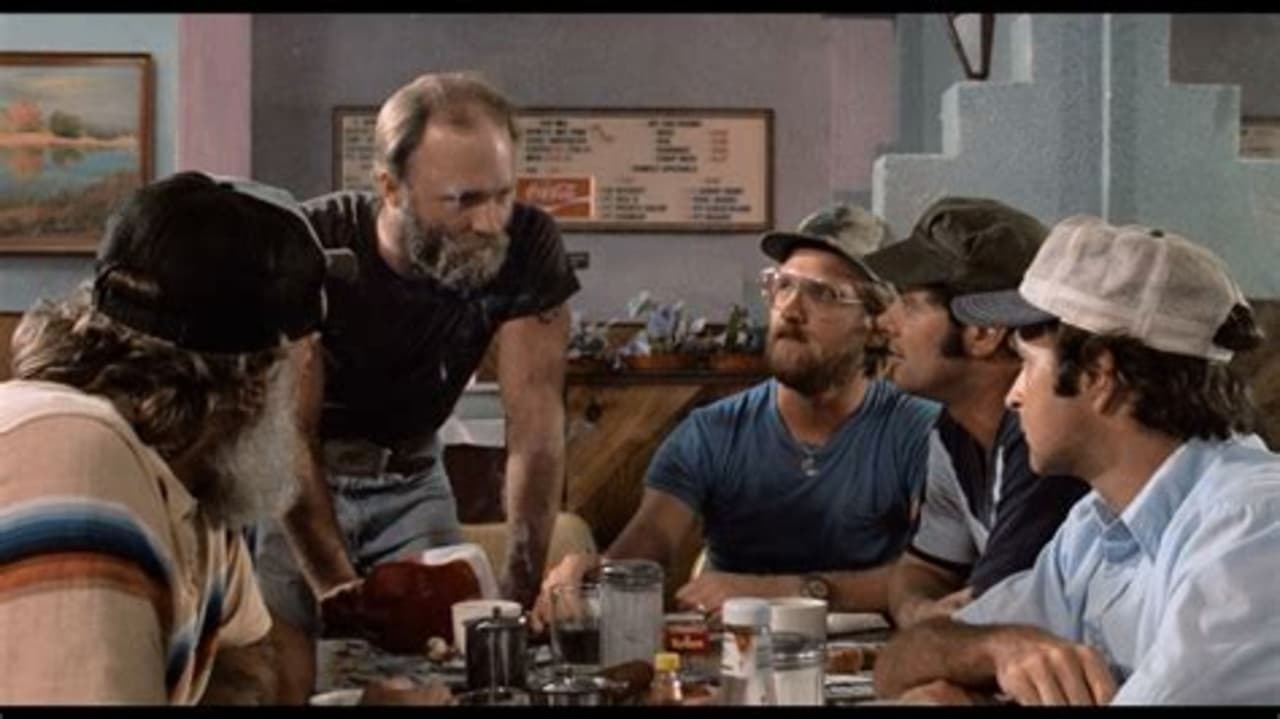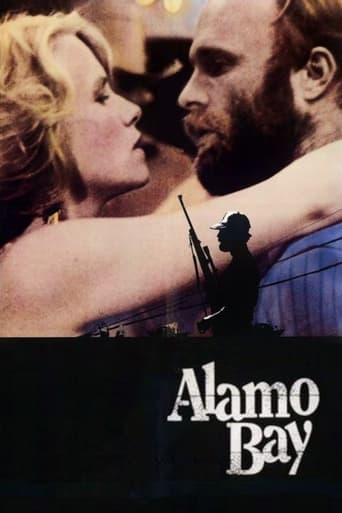

I like the storyline of this show,it attract me so much
... View Moreif their story seems completely bonkers, almost like a feverish work of fiction, you ain't heard nothing yet.
... View MoreThis is a must-see and one of the best documentaries - and films - of this year.
... View MoreEach character in this movie — down to the smallest one — is an individual rather than a type, prone to spontaneous changes of mood and sometimes amusing outbursts of pettiness or ill humor.
... View MoreIn Alamo Bay on the Texas coast, the local white fishing community feels inundated by Vietnamese refugees and they dislike the "gooks." There seems no end to the irritation they cause. First, they're Catholics instead of proper Christians. Second, they look funny -- except the cute little gals jest awigglin' down the street after school. Third, they speak some barbaric tongue. Fourth, they live according to standards known only in undeveloped, overcrowded countries. (This isn't too well illustrated in the film, but in actuality it probably was true; I say that, having lived with Chinese students in New York and Korean fishermen in Pago Pago.) Fifth, where was I? Sixth, the Vietnamese don't know the formal norms, so they pollute the bay and catch fish, shrimp, and crabs before sunrise and after sundown, which is against the law, and they encroach on traditional family fishing grounds. Seventh, they work like hell, and for low wages.All this vexation adds up and before you know it the rednecks in their caterpillar caps are roughing up some of the small and slender gooks. They're accused of stealing, excluded from other community facilities, chased away from the fishing grounds, and are finally run out of town by a stereotypical Ku Klux Klan. Everybody except the two gooks who operate the fishing boat belonging to Amy Madigan.Madigan's character is a spunky young lady. She's nobody's idea of a bleeding heart but she doesn't displace her anger onto the industrious gooks. (Anger is displaced when it's shifted to an easier target; a man gets chewed out by his boss, comes home and kicks the dog.) And there's a lot of anger in the white community. Shrimping isn't what it used to be. Ed Harris, Shank, has just lost his boat because the bank won't extend his loan. Big Government is sticking its nose into everybody's business. You have to have registration numbers on your boats and all that. The white folks have to comply with these impositions but the gooks persist in ignoring them.In the end there is a shoot out. The shoot out isn't handled with the kind of action and drama we're used to. The movie was directed by Louis Malle, a Frenchman. The pistol shots don't sound like 105 mm. howitzers going off. Nobody uses an ugly gun that sprays lead all over the place like a fire hose gone berserk. The Molotov cocktail doesn't explode in a fireball; it just breaks and spills some burning gasoline over the deck -- promptly extinguished by the timely arrival of the fire department. The gook who is beaten half to death has a face that remains recognizably human, though there's a bit of blood. When a heavy is shot, there is no squibb; he simply clutches his side and rolls over, as he would in a drama from the 1940s.Interesting questions are raised by the tale, which roughly reflects historical conditions around Corpus Christi. The racial prejudice and the displacement of anger aside -- "aside" because the motives are so commonly encountered -- what, exactly, do you do with a "rate buster"? Psychologists have shown that a consistent tendency exists in workers to establish certain norms of production. That is, everybody on the team works at about the same rate; not too slow, not too fast. That way everyone is comfortable and satisfied with the effort he's putting into the task. But what happens when somebody breaks this unwritten rule? Cool Hand Luke did it while his chain gang was shoveling sand over a freshly tarred roadway and it caused The Man With No Eyes to insert the bolt into his rifle. Here, the gooks run roughshod over the unwritten rules. Nobody likes a rate buster. But the question of what to do about them is neatly sidestepped when the Vietnamese are run out of town and the white folks can get back to a more reasonable level of exertion. Still, it remains a question of interest, maybe more than race and displaced anger, which can be overcome by moral evolution. Rate busters, regardless of ethnicity, rearrange the whole task structure. It threatens to shift the emphasis from cooperation to competition.
... View MoreNotice the stereotypes this movie presents: Vietnamese as courteous, hardworking, church going honorable people. Vietnamese war vets: racist, womanizing drunks. This is one of many films that utterly demonizes Vietnam vets. Madigans character so admires the Vietnamese leader that she declares: "You have to be the last cowboy in Texas".If you watch most Vietnam war flicks vets are usually (take your pick or all of the below) criminals, drug users or dealers, perverts, rapists, psychologically unbalance, racists. Yet statistics show that VV's are no more prone to this than the rest of the general population. Do not watch this crap.
... View MoreA French director telling the USA how screwed up their country is. It's always directors from outside who see more of the human damage on the USA citizens, like Wender's did in PARIS,TEXAS. But this film is uninvolving and not enough punch. Maybe I've been watching too many Oliver Stone movies. Only the brilliant acting saves it.
... View MoreThis film, like its director, was years ahead of its time. Before Mississippi Burning, Cry Freedom, and Rosewood solidified the cliches of the racism genre, Louis Malle delivered this authentic, effortless look at Vietnamese fisherman working off the gulf coast of Texas. No house burnings and lynchings need apply. Malle and his writer Alice Arlen pay such close attention to detail that the film pants with life in the hot Texas sun. The actors scarcely seem to be acting at all. It takes skill and courage to film an incendiary subject like this won with a level head and a compassion for all involved. Despite its route cinematic ending, this film's catch is bountiful.
... View More